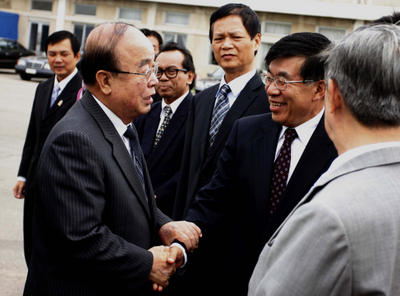Maybe ASEAN should make it the "seven party talks." With all due respect to the former Secretary General he does capture the essence of the north Korean position but he does not really offer a new approach other than for ASEAN to deeply study the issues and see things through Pyongyang's eyes:
But this line of thinking fails to duly consider the dynamic of the relationships between North Korea on the one hand and the US, South Korea and Japan on the other. For North Korean decision-makers their main, and perhaps only, concern is their own political, if not physical, survival. Their other likely concern is the survival and welfare of their families and friends after they are gone. (This is true in many other parts of the world.) Thus, what they fear most is regime change. And almost every day they hear threats of and demands for, explicitly or in effect, regime change from countries that are militarily stronger than North Korea.As a result, North Korea may perceive nuclear weapons as its only effective defence and means of survival. Thus rather than focusing solely on nuclear weapons, in order to improve the prospects of a deal the international community might do better by finding ways to begin to build trust with North Korea and offering effective and credible guarantees against regime change.A new approach towards North Korea is clearly called for and could contribute immensely to peace and stability in the region
But there have been numerous agreements and commitments over the years that would ensure the security of north Korea but the regime has broken every one of them. The problem is not only that the vital national interest of the north is survival of the Kim Family Regime but that the north still has hostile intent toward the ROK and the ROK/US Alliance to achieve reunification by force so that it can ensure regime survival. It continues to execute its strategy to split the ROK/US Alliance and get US forces off the Korean peninsula. Sure we would like to build trust on the Peninsula and President Park is providing the opportunity to do just that with her policy of Trustpolitik. However, in response I am reminded of the famous movie quote from Animal House in which John Belushi says "You screwed up. You trusted us." That has been happening for some six decades.
V/R
Dave
A new ASEAN approach to the Korean Peninsula?
November 23rd, 2013
Author: Rodolfo C. Severino, ISEAS
The chairman’s statement at the ASEAN Summit in Bandar Seri Begawan last month once again ‘stressed the need to maintain peace, security and stability in the Korean Peninsula’.

This included a call to encourage ‘peaceful dialogue including creating a positive atmosphere for the resumption of the Six-Party Talks’, and a reiteration of ‘the importance of fully complying with obligations in all relevant UNSC Resolutions and commitments under the 19 September 2005 Joint Statement of the Six-Party Talks… [and] support for all efforts to bring about the denuclearisation of the Korean Peninsula in a peaceful manner’. The ASEAN chairman’s statement at the East Asia Summit, the day after in the same city, said much the same thing, with the addition of trust-building and ‘humanitarian concerns’.
These are similar to previous ASEAN statements on the Korean Peninsula. But such statements have failed to make any significant contribution toward cooling tensions.
Each year the ASEAN chair, which is rotated among the ten members states on an annual basis, has the responsibility of producing the first draft of the chairman’s statement. Subsequently, negotiations are conducted among all the ASEAN member states. Usually this is done on the basis of the previous year’s statements and thus often ends up being almost identical year in year out, unless some new and significant developments have unfolded, such as the sinking in March 2010 of the South Korean naval vessel, ROKS Cheonan.
The result of this process is unsurprising given the necessary compromises involved in all negotiation. Avoiding any new, deep or realistic analysis requires less negotiating time and effort, both of which are invariably in short supply in the run-up to the summits and the annual mid-year meetings of foreign ministers. Moreover, bilateral relations with major powers and their interests in ‘sensitive’ subjects always have to be taken into account.
In order to truly promote peace and stability on the Korean Peninsula we need to place ourselves in the shoes of Pyongyang’s leaders and look at the disputes from their viewpoint. The international media and many academic commentators tend to see the North Korean ‘problem’ with purely external eyes focusing almost exclusively on nuclear non-proliferation. It is assumed that the ball is in Pyongyang’s court and the ‘problem’ can only be solved if North Korea gives up its nuclear weapons stockpile and production capacity.
But this line of thinking fails to duly consider the dynamic of the relationships between North Korea on the one hand and the US, South Korea and Japan on the other. For North Korean decision-makers their main, and perhaps only, concern is their own political, if not physical, survival. Their other likely concern is the survival and welfare of their families and friends after they are gone. (This is true in many other parts of the world.) Thus, what they fear most is regime change. And almost every day they hear threats of and demands for, explicitly or in effect, regime change from countries that are militarily stronger than North Korea.
(Continued at the link below)
No comments:
Post a Comment